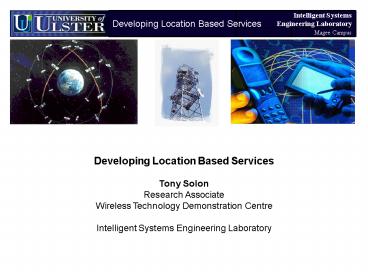Developing Location Based Services - PowerPoint PPT Presentation
1 / 22
Title:
Developing Location Based Services
Description:
Emulated positioning. Mobile phone LBS - J2ME. LBS Intro - Tech Review - WTRC R&D ... Location is increasingly important in mobile computing applications ... – PowerPoint PPT presentation
Number of Views:563
Avg rating:3.0/5.0
Title: Developing Location Based Services
1
Developing Location Based Services Tony
Solon Research Associate Wireless Technology
Demonstration Centre Intelligent Systems
Engineering Laboratory
2
- What is the Wireless Technology Demonstration
Centre? - Based in the Intelligent Systems Engineering
Laboratory (SCIS), Magee - DETI funded Northern Ireland Wireless Broadband
Flagship Project - Wireless- City, Campus, Council, Technology
Demonstration Centre - - www.wirelessderry.com
- 2 full-time researchers, supported by academic
staff - WTDC functions
- - Consultancy on wireless technologies to SMEs
start-ups - - Competitive advantage to these companies
- - Demonstrations of wireless technologies
- - Seminars/workshops
3
- Overview
- What is a Location Based Service (LBS)?
- Location-specific content
- Positioning systems enabling LBS
- WTDC LBS Work
- - Development environment
- - WTDC LBS applications
- - Lessons learnt
- - Current future WTDC LBS research
- Conclusion
4
- What is a LBS?
- LBS - app that is location-aware (Active/Passive
positioning) - LBS app domains
- - Maps way finding (Google Local Mobile,
Mappoint) - - Tracking (Personnel/fleet/equipment
management) - - Social mobile apps (IM)
- - Location-specific content (Locate services,
E-tourist Guide) - Ideally a LBS should be available 24/7 and
ubiquitously guarantee privacy
5
- Location-specific content
- The provision of location-specific
information/multimedia mediascapes - Points Of Interest (POI) form geospaces
- Remote/dynamic content - network coverage and
necessary bps - Local/static content - device memory
- Tourism, Business, Medical/Health, Education,
Direct mobile access, Games
Education/ Gaming/Health
Direct Mobile access
Tourism guides
6
- Positioning Systems enabling LBS
- LBS usually rely on positioning systems (PS)
such as - - GPS
- - Mobile Positioning System (MPS) -
fingerprinting/triangulation - - 802.11 - fingerprinting/triangulation
- - Static Bluetooth Nodes - fingerprinting
- - RFid/NFC
- - Semacodes
- Active PS - tracking w/o user intervention
- - geospace associated rules
- - geospace event -gt system
reaction (e.g. content) - Passive PS - user enters position/initiates
tracking (e.g. semacode) - - updated device position -gt location
specific event
7
Positioning System Comparisons
8
- WTDC LBS Work
- Development environment - Mobile Bristol Toolkit
(RAD) - WTDC LBS apps - Tourism, Education/Games/Health,
Direct mobile access - Lessons learnt - problems/issues
- Current future WTDC LBS research
9
- Development Environment
- Mobile Bristol Toolkit GUI, Magee map
integration, Logic toolbox
10
- Development Environment
- Campus PDA Tour Geospaces, Actionscript output
trace, PDA GUI
11
WTDC LBS Applications
Tourism guides City PDA Tour Campus PDA Tour
Education/Gaming/Health iPaqman
12
- WTDC LBS Applications
- Campus PDA Tour
Multilingual welcome
Main screen Menu
Tour started
MD geospace menu
13
- WTDC LBS Applications
- Campus PDA Tour
Continue Tour
Directory Internal positioning
Historic Timeline
Event info
14
- WTDC LBS Applications
- City PDA Tour geospaces/points of interest
- History/Entertainment/Accommodation/Restaurants/B
ars etc
15
- WTDC LBS Applications
- City PDA Tour
Splash screen
Intro
Guildhall Geospace content
Guildhall Video
16
- WTDC LBS Applications
- iPaqman
Geospaces
7/8 coins collected
Game completed
Game start
17
- Lessons learnt
- GPS MPS ( most PS!) accuracy varies
indeterminably - Geospaces need to allow for inaccuracies
- application specific geospace design
- consider users environment buildings, POIs
- geospaces associated rules must avoid
continuous event firing - fast changing UI events - usability degradation
- Repetitive testing - unpredictable PS
inaccuracies - LBS bugs can easily hide!
18
- Current WTDC LBS Research
- Integrated positioning using GPS, MPS,
Bluetooth, WiFi RFid - Zigbee RFid integration in sensory networks
Active Internal Bluetooth Positioning
Passive Internal Bluetooth Positioning
19
- Current WTDC LBS Research
- LBS on mobile phones - Java (J2ME) , Symbian,
Windows Mobile - PS depends on device capability - integrated PS
utilisation
Emulated positioning
Mobile phone LBS - J2ME
20
- Future WTDC LBS Work
- Seamless integration of active Positioning
systems - always best location - GPS, MPS, WiFi, RFid BT
- Variations in granularity/accuracy allowed by
mobile triangulation - - LBS using mobile triangulation current
mobile phones - Sensory networks
- Zigbee apps
- RFid apps
21
- LBS - Conclusions
- Location is increasingly important in mobile
computing applications - Various positioning systems currently available
- No one positioning system fulfils all
requirements - pro/cons - MB toolkit - applications
- WTDC research - integrated positioning system
- - Zigbee RFid sensory networks
- - J2ME LBS on mobile phones
- Trends - GPS in more mobile devices (e.g.
Motorola A1000, iPaq 6515) - Bluetooth improved cameras (e.g. Nokia N80 - 3
megapixel) - Integration of RFid readers (e.g. Nokia 5140i
3220)
22
Questions































